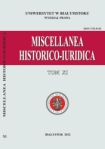Wybory do Rady Miejskiej i Zarządu Miejskiego miasta Wilna w latach 1905–1913
Vilna Town Council and Board Elections in 1905–1913
Author(s): Jacek WałdochSubject(s): Governance, Electoral systems, Pre-WW I & WW I (1900 -1919)
Published by: Wydawnictwo Uniwersytetu w Białymstoku
Keywords: Vilna; Russian Empire; Town Council; elections;
Summary/Abstract: The Town Council elections in Vilna (Vilnius) were conducted on the basis of the Town Act from 1870. This Act increased the amount of councilors and introduced new institutions, such as the Town Council (the Duma), the Board and the Head of the Town.The election of 1905 resulted in 65% of new councilors being elected, the majority of whom were Polish. Polish advocate Michał Węsławski, who was supported by the majority of the inhabitants of Vilna , was elected Mayor (President). Due to strikes, which were very common at this time, he started serving as Mayor very late, on November 26th 1905. The election of 1909 was a little bit different from the previous ones. In particular, the amount of people entitled to vote was increased to 1048, which was almost 800 more than in 1905. The election took place on May 11th 1909, but because of the protest of Russian electors the Governor decided to annul it and to conduct a new one. It took place on September 9th 1909. In accordance with the earlier decision of the Polish voters, Michał Węsławski was once again elected Mayor. The next election on October 24th 1913 was preceded by a big election campaign. Polish voters were politically divided into many groups, which presented similar programs and even had the same candidates. The non-partisan committee won the election, taking the majority in the Town Council and Michał Węsławski was elected Mayor for the third time.
Journal: Miscellanea Historico-Iuridica
- Issue Year: 11/2012
- Issue No: 1
- Page Range: 255-274
- Page Count: 20
- Language: Polish

